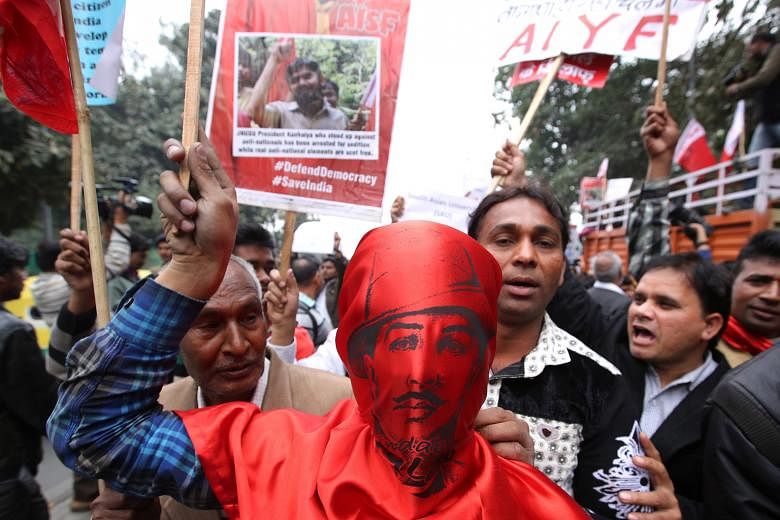India's top court refused to hear a bail application by a student leader controversially charged with sedition, in a widely followed case that is pitting freedom of speech supporters against Hindu conservatives.
Kanhaiya Kumar, who heads the Jawaharlal Nehru University (JNU) Students Union, yesterday sought bail after he was roughed up in a lower court by attackers shouting pro-nationalist slogans on Wednesday.
Explaining its decision, the Supreme Court said it did not want to create the impression that lower courts could not handle cases. It told Kumar to approach the Delhi High Court even as thousands of students from the university continued to boycott classes to demand his release.
Kumar was arrested on Feb 12, while at least seven others from his university remained under investigation for allegedly shouting slogans in support of Pakistan during a rally three days earlier.
Those at the rally also protested against the 2013 hanging of Kashmiri separatist Afzal Guru, who was convicted of the 2001 attack on the Indian Parliament.
Though Kumar has denied shouting anti-India slogans, the whole saga has inflamed sentiments on university campuses.
Students from dozens of universities have expressed support for Kumar while clashes have broken out in some places between rival student groups. Street protests took place in Srinagar yesterday.
Amid the protests and polarising debate on nationalism, about 40 federally funded universities on Thursday agreed to hoist the national flag on their campuses "prominently and proudly", according to a government statement.
Still critics have accused the government of trying to muzzle dissent, with top scholars, including American philosopher Noam Chomsky and Nobel laureate Orhan Pamuk of Turkey, extending "heartfelt solidarity" with JNU students and staff. In a joint statement, they condemned "the culture of authoritarian menace" created by the government of the Hindu nationalist Bharatiya Janata Party (BJP).
Analysts said the government had mishandled the incident. Vi- deos and images of BJP legislator O.P. Sharma beating up a left-wing activist outside the court complex on Monday have gone viral.
"JNU has always been an important platform for debate. Even when the Congress was in power, they (JNU students) took on their decisions. But the present government seems to believe that independent thinking (in education institutes) must be challenged," said Pro Vice-Chancellor Sandeep Shastri of Jain University in Bangalore.
"We have seen intolerance not directly from the government but from fringe groups. Visible steps need to be taken by those in power to demonstrate inclusiveness and there needs to be an agenda of inclusiveness."
Some have also drawn a link between the developments in JNU and upcoming state elections in West Bengal, where left-wing parties are strong, and Assam.
But BJP leaders have dismissed charges of a clampdown on dissent, with Defence Minister Manohar Parrikar accusing students who raise anti-national slogans of lacking in ethics.

